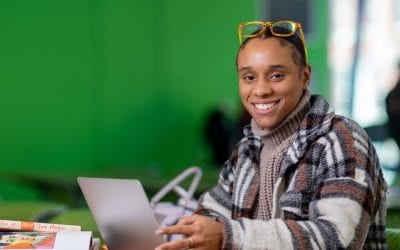As Mansfield Fellows, students develop tools for social activism
Scholarship Spotlightby Carla Beecher

The long-term effects of our simple, ordinary daily actions can significantly improve society, according to sophomore Mia Moore. Through the Mansfield Fellowship for Activism and Community Engagement, Mia and 14 other students spent last summer in communities across Chicagoland learning new ways to effect social change.
Mia is a member of the Honors Program with a double major in history and economics and a minor in social justice studies. She spent her placement at Eden Place Nature Center in Fuller Park learning about food injustice issues firsthand.
“It opened my eyes to the impact food deserts have on communities,” she said. “It taught me to take a deeper look at how things I do today can make the world a better place tomorrow.”
Through its conservation and agriculture programs, the South Side educational hub uses sustainable practices for growing healthy, fresh food. The Mansfield fellowship, which comes with a $2,500 stipend, helped support Mia as she planted, watered, weeded and harvested the farm’s fruits and vegetables, bringing healthy food to the community and strengthening the urban farm.

“My internship taught me to take a deeper look at how things I do today can make the world a better place tomorrow.”
– Mia Moore
Mia and several other fellows in her cohort began the summer with a three-day intensive course. Taught by Heather Dalmage, professor of sociology and director of the Mansfield Institute for Social Justice and Transformation, the course explored the context of community engagement. The fellows studied grassroots civil and human rights activist Ella Baker, among others, and analyzed approaches to demands for social and racial justice.
“Ella Baker’s work is a great example of how small, quotidian actions can change the world,” Mia said. “My internship brought to life some of the social justice theories I learned in class. It’s part of my educational journey, which has me leaning toward graduate school once I earn my degree.”
Virtual summer camp empowers and uplifts
For senior Caitlynn Liquigan, a virtual experience as a summer camp instructor for the Michigan chapter of Friendship Circle taught her about her ability to inspire and empower others.
The nonprofit reaches about 3,000 disabled individuals and their families each year through recreational, social, educational and vocational programming, while supporting participants struggling with isolation, addiction and other family-related crises.
“My fellowship taught me that there is individual power and strength that’s often overlooked, and that by embracing our differences, we can transform society.”
– Caitlynn Liquigan

Caitlynn is a psychology major with a criminal justice minor and a concentration in child and family studies. She spent 10 hours a week leading 20 participants from around the country in games, story time, conversations and other ways to make positive connections. She also developed a letter-writing program to gain one-on-one connections with nonverbal participants.
“My advocacy work highlights people’s shared humanity,” said Caitlynn, who plans on graduate school for social work. She helped participants better understand their feelings and find ways to uplift each other.
“I gave them the space to talk and restore whatever issue needed attention,” she said. “They formed and developed new habits and behaviors that furthered their social growth. Ultimately, I taught them new ways to confront the disability issues they’re each facing by advocating for themselves and others.”
Caitlynn added, “My fellowship taught me that there is individual power and strength that’s often overlooked, and that by embracing our differences, we can transform society.”
More in this section
Personifying DEI through determination and an open heart
If you want something done, give it to a busy person. That adage easily applies to Lyvette Medina Jones and her ability to juggle work and family with volunteering in her community.
A big change in tuition is brewing for the incoming class of 2023
A recent study by University of Chicago National Opinion Research Center revealed that Americans see the cost of education as the No. 1 barrier to completing a degree or beginning college.
A philosophical approach
In fall 2012, Roosevelt University’s Wabash Building opened — making history as the second tallest academic facility in the United States.



